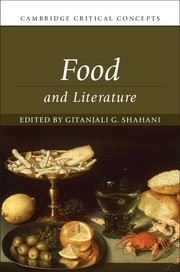Book contents
- Food and Literature
- Cambridge Critical Concepts
- Food and Literature
- Copyright page
- Contents
- Notes on Contributors
- Introduction
- Part I Origins
- Part II Developments
- Part III Applications
- Chapter 13 Inebriation
- Chapter 14 Vampires, Alterity, and Strange Eating
- Chapter 15 Toast and the Familiar in Children’s Literature
- Chapter 16 Food, Humor, and Gender in Ishigaki Rin’s Poetry
- Chapter 17 Food, Hunger, and Irish Identity
- Chapter 18 Postcolonial Hungers
- Afterword
- Index
- Cambridge Critical Concepts (continued from page iii)
- References
Chapter 16 - Food, Humor, and Gender in Ishigaki Rin’s Poetry
from Part III - Applications
Published online by Cambridge University Press: 26 June 2018
- Food and Literature
- Cambridge Critical Concepts
- Food and Literature
- Copyright page
- Contents
- Notes on Contributors
- Introduction
- Part I Origins
- Part II Developments
- Part III Applications
- Chapter 13 Inebriation
- Chapter 14 Vampires, Alterity, and Strange Eating
- Chapter 15 Toast and the Familiar in Children’s Literature
- Chapter 16 Food, Humor, and Gender in Ishigaki Rin’s Poetry
- Chapter 17 Food, Hunger, and Irish Identity
- Chapter 18 Postcolonial Hungers
- Afterword
- Index
- Cambridge Critical Concepts (continued from page iii)
- References
Summary
- Type
- Chapter
- Information
- Food and Literature , pp. 303 - 318Publisher: Cambridge University PressPrint publication year: 2018



